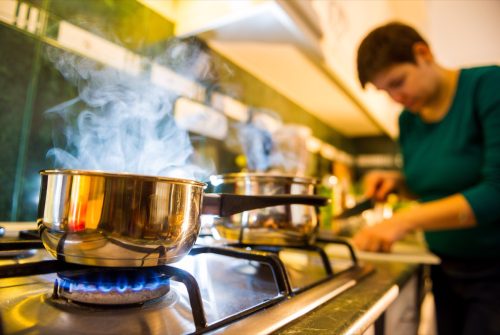If You Live Here, You Could Be Banned From Cooking This Way

Ordering in on a Friday night is something to look forward to after a long week of work, but sometimes cooking at home can be just as fun and convenient. Whether you like to experiment with new flavors or turn to your grandma’s signature recipe, there’s really nothing like a home-cooked meal. But now, some people may be upset to learn that one popular method of cooking may be on the way out. Read on to find out whether a new ban will affect you.
READ THIS NEXT: This Cooking Staple Could Disappear From Shelves, Starting This Month.
There are concerns about gas stoves’ effect on your health and the planet.

If you love to cook on a gas stove, you may be surprised to learn that it can have adverse effects on your wellbeing. A study published by Stanford University in January found that natural gas stoves contribute to a major amount of indoor air pollution, releasing methane, carbon monoxide, nitrogen dioxide, and formaldehyde.
As reported by Time, the study is the first to investigate this issue, even with over one-third of American households using gas stoves. Researchers found that the amount of methane leaking from natural gas stoves is about the same as the amount leaked by 500,000 gas-powered cars each year. Aside from general irritations, conditions like asthma and lower cognitive performance are two potential side effects of these pollutants—and you can be exposed to this both when your stove is in use and when it’s turned off, experts warn.
“Merely having the stove in your house creates a potential exposure pathway to air pollutants,” Seth Shonkoff, executive director of PSE Healthy Energy, a company that worked with Stanford on the study, told Time. The additional emissions are attributed to leaky pipes or connections that aren’t properly fitted.
On top of this, lawmakers and environmentalists across the country are concerned about how the burning of fossil fuels affects the environment. Many are calling to transition away from this, citing the worsening climate crisis. Now, different cities are taking action.
Residents in this city will be faced with new laws when it comes to gas stoves.

For those living in Los Angeles, most gas appliances are getting the boot, as reported by the Los Angeles Times. On May 27, the Los Angeles City Council voted in favor of banning new natural gas hookups. This will require that all new homes and buildings are instead constructed with electric appliances—including stoves, ovens, and furnaces. These new builds will be emissions-free, which means that they don’t contribute to carbon dioxide pollution.
Los Angeles is not the first city to approve a motion like this, as New York City enacted a ban on natural gas hookups in Dec. 2021, and more than 50 other California cities have done the same. Legislators in Massachusetts have also been pushing to allow these bans for new construction, according to Time. Currently, there is no nationwide ban on natural gas hookups, but in April 2021, President Joe Biden did announce a new initiative to reduce methane emissions in the U.S. by 50 to 52 percent by the year 2030.
RELATED: For more up-to-date information, sign up for our daily newsletter.
Officials have not announced an exact timeline for the initiative.

As reported by the L.A. Times, these plans currently lack a concrete timeline, but residents can likely expect new requirements to kick in within the next few years. Change won’t necessarily be universal either, as different types of buildings and operations may have a “phased-in compliance schedule,” the outlet explains, including restaurants that need gas stoves to carry out daily operations.
While this change has the potential to reduce both indoor and outdoor air pollution, the use of electric-only power is also getting pushback from different groups. Gas companies obviously recognize the major threat to business, as do the industry’s union workers. Approximately 20 U.S. states have also passed “preemption laws,” which prohibit local municipalities and cities from banning the use of natural gas, according to CNN.
Rolling out this initiative for existing homes is a bit more complicated.

The recently announced ban specifically focuses on new natural gas hookups, leaving many with existing gas stoves in their homes wondering how they might be affected. Activists and legislators are aware of this as well, as it can be costly to replace a gas stove with an electric model. Researchers at Stanford further pointed to the associated environmental impacts of throwing away functional stoves, Time reported.
However, researchers maintain that gas stoves are more dangerous to both our health and the environment than electric stoves.
“Stoves are the only appliance where we are allowed to emit pollution directly into our homes,” Rob Jackson, PhD, professor of earth system science and senior fellow at Stanford Woods Institutes for the Environment, told Time. “Every furnace or water heater is required to vent to the outdoors—we would never stand over the tailpipe of a car breathing, yet we are perfectly happy to stand over our stoves and breathe their pollution.”
Until there is more information about these stoves, as well as policies to remove them, you can take small steps to lower your health risks and your carbon footprint. When using a natural gas stove, researchers recommend always turning on the hood vent or fan when cooking and keeping windows open.
READ THIS NEXT: Never Prepare Chicken Like This, CDC Warns.